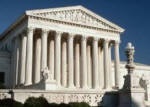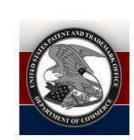Newsletter Issue 49 - March 2013
In this issue:
Supreme Court on standing.
Copyright First Sale Doctrine
Deadline rush
Ask Dr. Copyright
Dear Doc:
I've been listening to NPR, and when they talk about Supreme Court
cases, they talk about someone standing around, and how much that
matters to all them old folks on the Court. Then they complain that
folks lack standing (I guess they never heard of those tall desks
like old Tom Jefferson used.) Now, I can understand a bunch of
senior citizens being concerned about people standing, but why does
it matter to the rest of us, and why don't they just get more chairs
in the courtroom?
Signed,
Supremely Clueless
Dear SC:
NO! NO! NO! It's not a lack of chairs, it's a lack of standing. Let me explain...
Under the Constitution, Article III (stay with me here) our courts are only allowed to decide "cases and controversies". That's a way of saying that you're not allowed to ask a court a hypothetical question, like, "If I were to shoot an arrow into the air and it came down I know not where, but, like, onto the top of my good-for-nothing son-in-law's thick skull, would I be found guilty, or be given a medal for thinning out the gene pool?"
Courts can't answer such questions. The Founding Fathers wanted to be sure that judges would not have to work very hard, so they made sure that only REAL cases can come before the courts. Since judges can't just come right out and tell folks to get out of their courtrooms, they invented this concept called "standing".
For you to have standing, the outcome of the case must affect some right or interest of yours. You literally can't just be a bystander. When the Supreme Court really, really does not want to answer a question, it can determine that one of the parties to the case actually never had a right to bring the case to the courts in the first place. So, let's say that you see that Monster Corporation has just been granted a patent on a product that you want to make, right after you convince your brother-in-law to invest $1 million in your company. You can't sue Monster to invalidate the patent because they have not threatened to sue you. Monster can't sue you, because you have not "made, used, sold or imported" the patented product -- you've only thought about it. See? Nobody has standing, and the courts will politely throw you out in the street if you try to bring a lawsuit. Got it?
Good! Now why are you just standing/sitting around reading this? Listen to your Mother...go outside and play in the fresh air!
The "Doc"
Kirtsaeng Wins Before the Supreme Court!
If you're a regular reader of our newsletter, you may recall in
2011 our writing about
Supap Kirtsaeng's legal problems when he was sued by John Wiley
& Sons, Inc. ("Wiley") for selling text books on e-bay. Kirtsaeng, a
Thai national, opened a used textbook business in 2009 to support
his educational studies in the United States. He enlisted his
friends and family in Asia to buy textbooks and ship them to him in
the United States for resale on e-Bay. Kirtsaeng was later sued by
Wiley - the copyright owner - in federal court for copyright
infringement. Wiley based its lawsuit on Section 109(a) of the
Copyright Act, which prohibits the importation of copyrighted works
created outside of the United States without the authorization of
the copyright holder. The language of Section 109(a) is important.
It provides that:
the owner of a particular copy ... lawfully made under this title,
or any person authorized by such owner, is entitled, without the
authority of the copyright owner, to sell or otherwise dispose of
the possession of that copy . . . .
The first sale doctrine permits owners of copyrighted works, even if
they are not the creators, to resell copyrighted works without fear
of lawsuit by the creators. Copyright owners, such as Wiley, argue
that the "lawfully made" language, quoted above, only applies to
works that are manufactured in the United States. Assuming that is
correct, then the first sale doctrine would not apply to works
manufactured outside of the country. Therefore, Kirtsaeng's
importing and reselling of foreign purchased textbooks would not be
exempted by the first sale doctrine.
At trial, the federal district court prohibited Kirtsaeng from raising the first sale doctrine as a defense to copyright infringement and as a result, the jury found in favor of Wiley and awarded it damages for intentional copyright infringement. Since our newsletter was published, the Court of Appeals for the Second Circuit affirmed the lower court, concluding that §109(a)'s "lawfully made under this title" language indicated that the "first sale" doctrine does not apply to copies of American copyrighted works manufactured abroad.
Kirtsaeng did not take "no" for an answer and appealed the Circuit Court's decision to the United States Supreme Court, which issued its opinion on March 19, 2013. The Court reversed, holding that the first sale doctrine applied to any work whether it is published in the United States or abroad. The Court's opinion was based largely on statutory interpretation. Here are the highlights:
• Section 109(a) says nothing about geography, the lower courts'
reading "bristles with linguistic difficulties";
• Historical and statutory context indicate that Congress did not
have geography in mind when it drafted the current statute;
• The common law "first sale" doctrine did not embrace a
geographical component and, therefore, one must assume that the
statutory version retained the common law given no evidence to the
contrary;
• imposing a geographical component to Section 109 would not further
the constitution directive of "promot[ing] the Progress of Science
and the Arts;"
Justice Breyer delivered the opinion of the Court.
The Rush to Meet the March 16th Patent Deadline
According to a chart released by the U.S. PTO, about 26,500 provisional and non-provisional patent applications were filed on March 15, up from the about 2,500 applications that are filed on a typical day. The reason: inventors and their patent lawyers (including us) were racing to beat the March 16 deadline.
As we have said before in these
newsletters, U.S. patent law changed on March 16. Now, after
March 16, patent rights are terminated and lost forever if (a) no
patent application has been filed, and (b) there has been a sale or
offer for sale of the invention, a public use of the invention,
description of the invention in a printed publication, or the
invention is 'otherwise available to the public.' If you have an
invention and intend to take any of these actions, please contact us
first so that you do not inadvertently lose your U.S. patent rights.

